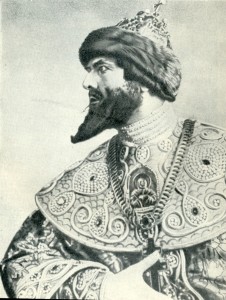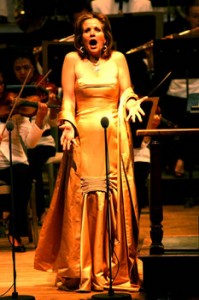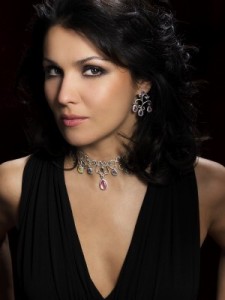A Night at the Opera
categories: Cocktail Hour
17 comments
This past Friday night I showered and shaved and dressed and rushed out of my elderly father-in-law’s apartment, Upper West Side of Manhattan, and hoofed it down to Lincoln Center, early curtain at the Metropolitan Opera. I got in the line for last-minute tickets and asked for the best seat available, knowing people often donate back their season seats at the last minute, also knowing it was a new production in its second performance, and sold out. But: Row J, orchestra center! A mere $210.00. Ticket in hand I rushed back uptown to get a slice of pizza (like four blocks away), wolfed it, and ran back, loving the new fountain in the refurbished Lincoln Center plaza, also the familiar and enormous Chagall hangings in the great windows of the opera house. Inside, I always love climbing the steps with all those dressed-up people (I’m always the one in blue jeans, or worse: one time I forgot the Leatherman on my belt of my shorts, got pulled aside–I showed it was pliers and the guard said, “Right, pliers with like three knives,” but he let me through, honest face). The Chagalls, the lights everywhere, the slightly tatty but anyway sumptuous red carpet, the plus-size manikins wearing historic costumes, the downhill entry to the auditorium, the breathtaking height of the tiers of seating as you enter the theater, wonderful. I took my seat among all the finery and felt it again: this is a much better place to invest the millions than, say, Patriot Missiles.
The opera was Modest Mussorsky’s Boris Godunov, which had only just premiered in this incarnation three nights earlier. I’d never seen it, never listened to the music, knew very little about it, except that it was about the post-Romanov Tsar Godunov, the one Boris Badenov from Rocky and Bullwinkle was named after. Way after. (“You busy bodies have busied your last body!”)
The proscenium is decked out for the performance. Even the four-story curtain is emblazoned with a griffin from the Tsar’s seal, and far above, an enormous sleigh is hung, like a sixteenth-century school bus, woolly-mammoth tusks for runners, looked like to me, the house seats filling, ladies in furs on the cool night, some beautiful gowns, some weird ones, too, young women on withered arms, a guy in a rag-wool tunic, a lot of prepossession and calm selfhood, yours truly bubbling away at the center of it all in new Banana Republic chinos and black shirt. A better-dressed fellow tapped my shoulder, very gentlemanly said, “We must have the same seat number,” and not, “You’re in my fucking seat.” I’d sat a row back, I guess hardly believing I could be so close: 11th row instead of 10th. We shuffled around, all very polite, and I was happy to leave the vast perfume of the lady who’d been seated beside me behind in favor of the next neighbor’s waft, sweeter. The orchestra began filling in, that sound of tuning like traffic, stray melodies and honks and whistles and thuds, finally the concertmeister standing on the conductor’s podium and playing his A string. “Ah,” the fellow next to me said, ready to go. He was on the aisle and very likely the seat I was in had been his donation. “Ah,” I said right back.
The production opens with Boris, sung by Rene Pape, just standing there, silently praying as the overture plays. It always takes me a minute to dissolve my boundaries into the story, not just see a large guy in a goofy costume standing on a huge stage, but even more so at the Met having taken a behind-the-scenes tour a couple of years ago, an amazing factory, really, sets stacked and arranged and even choreographed back there, metal shops and wood shops and electrician shops and a doctor’s office and wig shop and makeup parlor and basement practice rooms and rehearsal spaces and dressing rooms big and small and rack after costume rack and rooms of seamstresses and tailors and even guys painting blood on multiple shirts for a single character with airbrushes. So, hard to forget he’s a guy on a stage wearing a dusty wig on a raked stage in front of a curtain that hides the set for Carmen and the Ring Cycle and ten or more other current productions (with other sets out in Jersey in massive warehouses), makeup applied thick, the pinnacle of the constant labor of the Met’s 860 full-time employees (!), and as many as 1200 part-timers.
Boris, as he stands there praying, doesn’t want to become Tsar. Russia’s in a huge mess. And that’s just the prologue.
Act One starts with a crowd–the dazzling Met chorus packed 200 or more into a street scene with Russian cops beating them with clubs and snapping whips and singing threats at them as they sing back pleas and imprecations. It would be more impressive if the chorus people weren’t tripping over each other and acting in such bold gestures like mouth gapes and fearful hands (maybe the problem with being up close there in Row J–you see all these dentists and firemen and office workers and understudies with great, great voices and vocal training trying to be Russian peasants and it doesn’t quite fly. Or maybe I just know too much, not fair).
And so on, Boris finally, sighingly (acting out the weight of the office being thrust upon him), becomes Tsar. He sings his sorrows and prayers and guilt to his children, and Mr. Pape (a German bass who’s sung all over the world, and at the Met 150 times), finally carries me off, my god, carries me past all the artifice, all the spectacle, all the effort, and I feel it, feel it, holy shit: poor Mother Russia!
The fellow next to me turns as we’re clapping our way into the intermission, says, “He’s wonderful.” “Wonderful,” I repeat.
The whole thing’s four and a half hours long, like a baseball playoff, which we happen to be missing, Yankees getting smashed by Texas. But there’re two intermissions. At the first I get an espresso and a shot of Bushmill’s (they don’t have Jameson’s). I don’t normally drink coffee, so the espresso’s like a hit of speed, which I’ll need, famous as I am for nodding off during peak scenes and performances (I missed half of Simon Boccanegra a couple of years back in a $300 parterre box seat, learned my lesson). I wait till the little man plays the go-back-to-your-seat tune on his mini Glockenspiel (he’s a real musician, and the post is coveted), race to the men’s room, pee at length. This way, there’ll be no distractions. Back in my seat, I turn to my benefactor again. He says the fellow I changed seats with is Stephen Wadsworth, the producer of this evening’s offering. “Ah,” I tell him.
We’re in Act III now, and any writer can learn something from the excitement of the introduction of a new character, in this case the desirable, gorgeous, sexy, power-mad Marina, played by Ekatarina Semenchuk, from Minsk, Belarus, a portly, squarish mezzo-soprano. She’s got a lot of fire and smoke and attitude, but she’s not the sort you might think of as the most desirable woman in all of eastern Europe. Her wig of long, long ringlets must weight fifty pounds, bright red. This is always a theme in opera going–you have to fit the singer with the role by means of your imagination. Because it’s all about the voice. Is the idea. (Though recently, many opera companies and the Met in particular have been paying more attention to casting across the whole character, and more attention to dramatic and narrative values in general. For example, and oh my god, Anna Netrebko playing Elvira Walton in I Puritani, which I saw at the Met from first row far left, a genuinely beautiful woman, also young enough for the role, and for Playboy Magazine, not that I’m focussing on anything but her voice and physical drama, the flinging herself to the very edge of the stage in Elvira’s mad scene, a half-hour aria!, her long black hair hanging into the orchestra pit, the singing upside down: I screamed when she was done, I screamed and stood and shouted and stomped my feet, as did the rest of the audience, roared like soccer fans, all but threw our underpants!).
Anyway, Ms. Semenchuk was underwhelming in the role, more kind of irritable than world-class bitchy, more matron than beauty, and not powerful enough to beat the chorus at their own game. Marina’s in league with Grigory, who claims to be Dimitri, who is Boris’s dead son. Together, eventually, they will take over the Kremlin, singing all the way, never a smile, nothing but stage kisses.
Another thing writers can learn from this opera is to avoid exposition. So much here is guys (and it’s mostly men) standing up and singing you through the background of the period. It’s like voiceover in a disapproving documentary about Russian history, but you have to watch the voiceover artist instead of the action.
One device used in this production made some sense, and was a smart way to contain all that historical blather: a gargantuan book flat on the floor stage right, with real pages, which are turned and written upon by the monk Pimen. He sings as he writes, and what he’s writing is all that exposition: successions of tsars, plots and intrigues, none of it onstage. The book is a cool object, though, and gives you something to think about–the singers actually stand on it when what they have to say is historic. It’s tough for everyone when the main character is an abstraction: Mother Russia.
Overly buzzed from the espresso, I had another whiskey at the second intermission. Back in the auditorium, I turned to the fellow I’d traded seats with and said, “Wonderful production, wonderful.” I said it significantly to let him know I knew who he was. And he said the warmest, most soulful “Thank you.” The guy who’d told me who he was and who’d donated my seat so that I could be there at all looked at me inscrutably.
But really, it was a little overdone, a little too heavy on the spectacle (I don’t mind spectacle normally, but spectacle’s so Italian, works better with Puccini and Bellini and Verdi), the two live horses toward the end simply too much, and balky, at that, under all that that weight. Oh, would that they’d have reared up and whinnied and galloped through the chorus and off the stage with Marina and Grigory on their backs. But no.
Still, Boris’s death scene was well sung, and lingering, no one to put him out of his misery, a very long death, the ghosts of his children lying in front and atop him, an actually pretty moving tableau.





GENTLMEN, SORRY, BUT ALL IS DELIRIUM IN THIS ARTICLE!!!!
This is not Ekaterina Semenchuk on the photo, this is Renee Fleming !!!
http://www.maverick-arts.com/cgi-bin/MAVERICK?action=printView§ion=articles&issue=449
http://www.berkshirefinearts.com/?page=article&article_id=776&catID=8
Here is Ekaterina Semenchuk:
http://www.imgartists.com/?page=artist/artistPicture.html&id=10157
Gosh, you’re right! A caption error… Many thanks for the close reading, and I admit to delirium…
Bill, I loved your opera piece!! I remember seeing your parents at the Met, many years ago, as I came in at intermission (dressed in jeans), having snagged a ticket from someone who was leaving! They were so surprised to see me, and I them!
We go to nearly all Simulcast productions since Theatre is one mile away. Very popular so you go an hour early for good seats. Close ups & sound terrific . Also interviews usually conducted by Rene Fleming during intermissions are fun. So no more Met in NYC for us. We reread your essay after the Opera and enjoyed it even more . But I liked Ekatarina. She perked things up.
I loved your take on seeing this opera. Looking forward to more of whatever you write.
Try the Giants and Phillies game tonite. Go Giants! Go Opera!
Your new fan,
Peggy
I think my favorite part of this is your description of the experience just showing up– the tradition of the grandeur and spectacle of it all. Having worked behind-the-scenes at the opera (alas, not yet at the Met!) and more often, the theatre, it’s one of the things I like best about my job. I’m lucky that just the act of “going to work” can contain so many little moments of elegance and beauty– even when ten minutes later I’m covered in thread and hoisting actresses into corsets.
I will be going to Puccini’s La Boheme on the 31st here put on by the Cape Cod Opera Co. at Tildon Hall at CCCCollege. These productions are by a New York company who comes here twice a year with magnificent productions. They have all been fantastic. A great alternative to going all the way to NYC. It sounds as if you had a great time. Opera is so beautiful because of the harmonies and emotion evoked by the singing. I love it. Once during Turandot I felt as if I had been transported! So glad you wrote about it. It makes me want to go to the Met again. (But not to pay $210.00 a ticket!)
I love small company productions… Sometimes they have traveling singers in the most difficult roles. I’d be interested to hear how you enjoy this one! And there are much cheaper tickets available, if you’re ever in New York, often last minute.
I went to my first opera last year–whathisname, not Pavoratti (sp? and isn’t he dead?) but the other guy–was singing a role he’d done 25 yrs ago. My sister Anne is the opera buff, so sister Cathe and I went along in half-protest, scouting the area around Lincoln Ctr for a bar , intending to skip Act 2 and then sneak back in for Act 3. My sister Anne, ever the teacher (my own former English teacher) made us dress all up and kept reminding us that “you see funny combos at the opera, everything from ball gowns to ball caps, often in the same party.”
The opera was sublime, the thought of ditching it for even one aria unthinkable. The death scene at the end was a bit melodramatic and possibly endless and defied all laws of biology and happy endings, but the curtain finally came down, and on the way out, streaming down those lovely stairs, surrounded by ball caps and ball gowns, and my sister was one again expounding on opera as the great equalizer, I heard a man behind me say to his companion in a rich Bronx accent: “There’s nuttin’ you can do about it. That’s the way it was wrote.”
Bill, I hope you wore your pink shirt and charcoal jacket. 🙂
Monica, I was absolutely thinking of you when I mentioned what I was wearing at all! And at Banana Republic that morning I did look at pink shirts. But they were fitted, and I am not! Was it Placido Domingo? What a treat.
Oh, yes, it was Placido Domingo, in a role he was 30 yrs too old for. But nobody cared. I forget the opera–Lamamour somethingorother. You can see I am an opera ignoramus. But it was such a glittery evening, so much fun. But good god, these DEATH scenes never end.
Oh, and P.S., I’m sure you looked very, very chic in your black shirt.
What George did not point out is that his daughter’s real name is not Nina but Marina, a character gloriously introduced somewhere between the second and third act of my life. (Obviously your Marina paled in comparison.)
This is very sweet. I feel pretty confident, though, that I arrived near the beginning of the second act. In all my power-mad glory.
I am calling you Marina from here on in, and calling David “Dimitri the Pretender.”
Enjoyed essay ( have read all your essays in this series ) but related especially to this one because my wife & I are seeing the opera Sat . On simulcast at theatre 1 mile from our house. So we are glad to have your good recommendation. Our granddaughter thinks opera is too complicated , but we love it and she will too one day. Thanks for all your essays & especially this one . G dG (Nina’s Dad & thus Dave’s Father In Law).PS: At theatre tickets cost $21 each.
George, thanks. Those simulcast presentations are terrific… Love to hear your impression of the opera with that kind of view. When you’re in New York, note that a donor has made 100 or so “rush tickets” available at the Met day of performance for $25, or $20 for seniors, orchestra seats, too! And you can always get standing room for $17 or so… Wonderful… I save up my pennies and treat myself a couple times of year to the posh seats… Someone’s got to represent the scruffy!